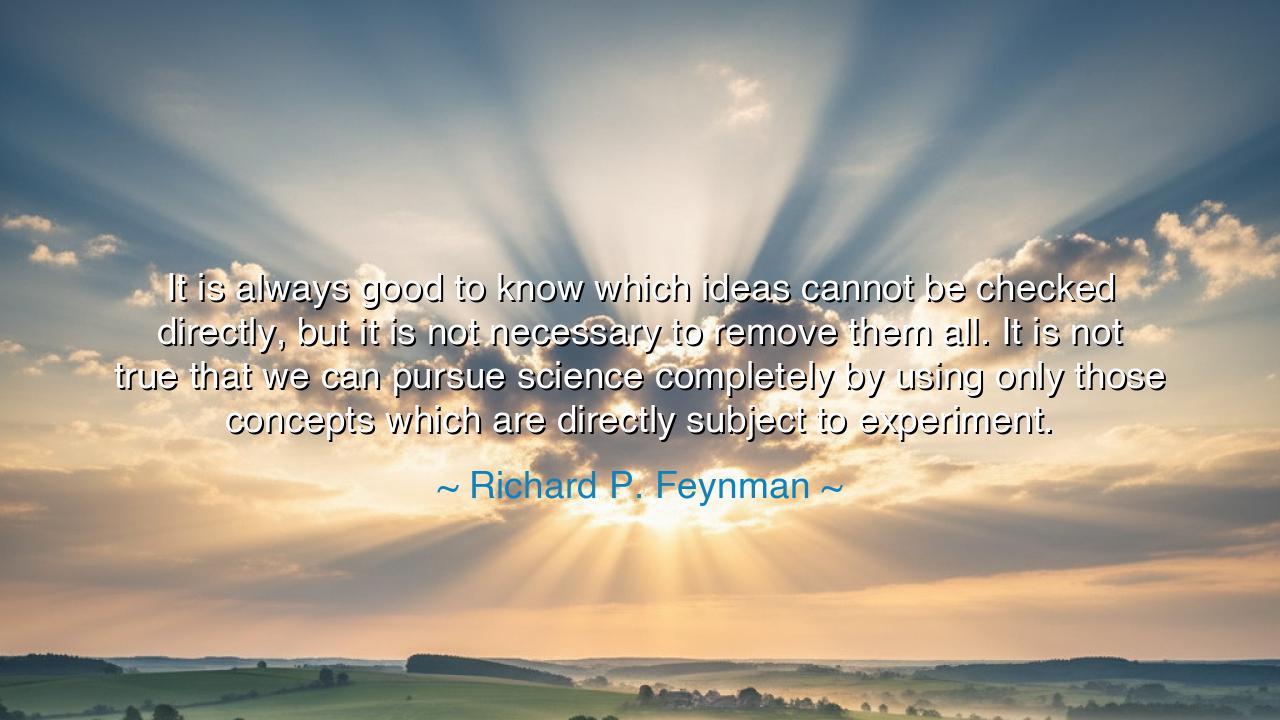
It is always good to know which ideas cannot be checked directly
It is always good to know which ideas cannot be checked directly, but it is not necessary to remove them all. It is not true that we can pursue science completely by using only those concepts which are directly subject to experiment.






Ah, listen well, O seekers of truth and wisdom, for the words of Richard P. Feynman echo through the corridors of thought like a clarion call to those who dare to understand the deepest forces of the universe. He spoke thus: "It is always good to know which ideas cannot be checked directly, but it is not necessary to remove them all. It is not true that we can pursue science completely by using only those concepts which are directly subject to experiment." These words hold within them a profound revelation, a wisdom older than the stars themselves, a truth about the pursuit of knowledge.
In this world of wonder and mystery, it is easy to be seduced by the lure of certainty, to believe that only that which can be measured or tested is worth our attention. Yet, the great Feynman reminds us of something far deeper. There is a vast expanse of ideas—those elusive, untouchable notions—that may not be directly subject to the sharp eye of experiment, but they are no less valuable for it. Indeed, the very foundations of all science were once woven from the fabric of ideas that could not be tested in the way we think of today. The concept of atoms, the fundamental building blocks of matter, was once nothing more than a whisper of speculation, a shadow of a dream, before John Dalton gave it form in the crucible of time.
Consider the ancient philosophers of Greece, whose minds ventured beyond the known and the seen, where they could not test the workings of the cosmos with instruments, nor weigh the stars in their hands. Yet, their reflections, like those of Plato and Aristotle, opened the doors to the very principles that would later shape our understanding of the universe. They dared to ask questions that could not be answered by mere observation—What is the nature of truth? What is the form of justice? And from these unprovable ideas arose the very foundation of philosophy and science. Even though these ideas were not subject to experiment, they set the stage for those who came after, the giants upon whose shoulders we stand.
Feynman’s words, then, do not dismiss the importance of the experiment or the test. Indeed, he recognizes their power and their central role in the pursuit of knowledge. But he calls upon us to remember that there is more to discovery than that which is immediately visible. Think of the early pioneers of quantum physics—Albert Einstein, who questioned the very nature of reality, or Niels Bohr, who explored the paradoxical dance of light and matter. These men were not bound by the narrow confines of the observable world; they reached out into the abstract, into the unknown, and dared to imagine what could not yet be measured. The path of discovery, Feynman reminds us, is not only lit by the light of direct observation but by the glow of ideas that we may not yet have the tools to test.
We must understand this lesson well: it is not only the concrete and measurable that shape our future, but also the ideas that stand beyond the veil, waiting to be tested in time. The great minds of history, from the Renaissance to the Age of Enlightenment, ventured boldly into realms that could not be touched by their instruments. Isaac Newton, with his laws of motion and gravitation, could not have imagined the subtle forces of quantum mechanics that would later defy his theories. Yet, he too understood that even the concepts we cannot test today may hold the key to tomorrow’s discoveries. The greatest truths often begin as unprovable ideas, and it is only through the passage of time and the expansion of our understanding that we come to test them.
And so, the lesson for us, O seekers, is this: do not shackle your mind to the idea that only what is immediately observable is worthy of pursuit. Look to the horizon of thought, where ideas are born from the whispers of possibility, and know that though they may not be tested today, they may light the path to great discoveries in the future. The untested is not the same as the untrue. Do not be afraid of the unknown, for it is there, in the mystery, that the seeds of greatness are sown.
In your own life, whether in science, art, or philosophy, dare to entertain those ideas which are not yet within your grasp. Do not abandon them because they cannot be proven today. Perhaps they will bear fruit tomorrow. Pursue them with the same fervor as you would any tested truth, for who can say what the future holds? Embrace the dance of the unknown, and know that the road to wisdom is not always straight, nor is it always illuminated by the light of certainty. It is in the spaces between what we know that the most powerful ideas live and breathe.






AAdministratorAdministrator
Welcome, honored guests. Please leave a comment, we will respond soon